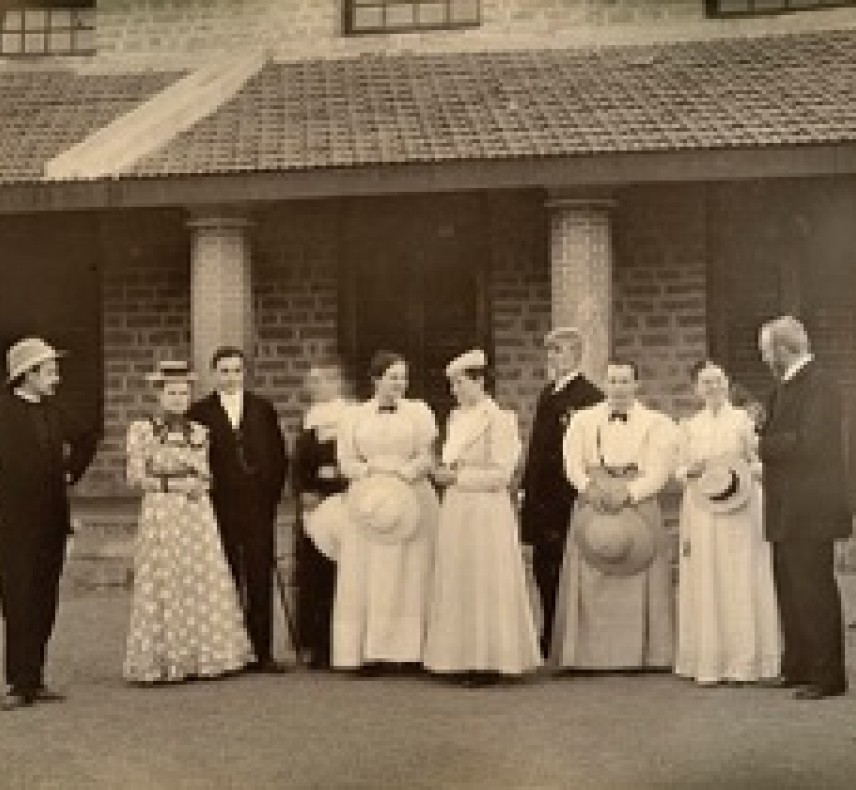Nellie Becker, class of 1896, lived a life that was far from mundane. From the halls of Wittenberg University, she went on to travel the world, came face to face with countless deadly diseases, and was one of the few survivors of the RMS Titanic.
Nellie was born in New Lexington, Ohio, on June 19, 1876, the daughter of John Baumgardner, one of the earliest photographers in the Springfield area. As a young woman, she entered Wittenberg’s two-year preparatory school and there met her husband, Allen Becker, whom she married on Sept. 20, 1898, two years after graduating from Wittenberg.
Little is recorded of Nellie as a student at Wittenberg. However, The Wittenberger, predecessor to The Torch, mentions that her husband, also a member of the class of 1896, attended the Wittenberg Seminary with hopes of becoming a foreign missionary. Their marriage took place just a few months before beginning their first term as Lutheran missionaries in Guntur, India.
While in India, Nellie and Allen kept connections with Wittenberg. They lived with other missionaries who were also Wittenberg alumni and received copies of The Wittenberger abroad. Allen would even send in letters and updates to be published in The Wittenberger. In one letter, Allen describes the couple’s first day in India as “a little rough” because their pony cart flipped over while they were traveling on the road.
Nellie and Allen faced harsh conditions in India. They arrived in a time of terrible famine, extreme weather, and were located in an isolated area where it was almost impossible to keep in contact with friends and family in America. The most dire condition facing the Beckers, however, was the outbreak of cholera. The couple lived in India during the Sixth Cholera Pandemic, which took 800,000 lives in India alone. Allen wrote to The Wittenberger that he and Nellie were witnesses to many passing from cholera.
Surrounded by cholera victims and fearful for the health of her newborn child, Ruth, Nellie’s emotional state began to decline. Acquaintances of Nellie remember that during these five years, her nerves gradually gave way and affected her physical health, ultimately prompting the family to return to America for 15 months of rest in Lima, Ohio, where Nellie gave birth to her second child, Luther.
Once Nellie had recovered, the family returned to India. Their second term in India was dedicated to running a boys’ orphanage which trained children in skills such as weaving, carpentry, and printing. During this time, a daughter, Marion, and a son, Richard, were born to Nellie and Allen. Unfortunately, conditions in India had not improved during their time in America. In 1907 (as Nellie was pregnant with Marion), Ruth, Luther, and Allen were all severely inflicted with illnesses. Although Ruth and Allen survived their infliction, two-year-old Luther died from tetanus.
With these hardships abroad, along with the sudden illness of her son Richard, it is understandable why in 1912 Nellie decided to take her three children back to America while her husband served the remainder of his six-month term in India. After taking a boat from India to England, she and her children set sail for America on April 10, 1912, aboard the Titanic.
According to an account of her experiences that she gave at Wittenberg a few months after surviving the sinking of the Titanic, Nellie mentioned that she was nervous to board the ship, since it was its first voyage. However, with the desire to bring her sick child home and reassurances from officials of the liner’s unsinkable nature, she bought her family second-class tickets.
Nellie reports that she did not awake when the ship hit the infamous iceberg, but instead when the sound of the engines stopped. First, a steward assured her that everything was fine and to return to her room. Soon after, another steward directed Nellie and her three children to the upper deck, with no time for them to dress. Nellie relayed that she had not truly realized she was in danger until witnessing the shooting of rockets as distress signals and hearing the ship’s band play.
Nellie instructed Ruth to retrieve blankets from their room, at which time the other two children were placed in a lifeboat. Nellie pleaded to join them and was thrown in the boat as it was being lowered into the water. Ruth also eventually found herself in a life boat, but because she was on a separate boat, Nellie had no way of knowing whether her daughter was dead or alive. It was not until after hours of wading in the dark water and looking desperately for her daughter on the RMS Carpathia, which rescued survivors of the shipwreck, that Nellie was reunited with her daughter.
Allen’s absence from the Titanic turned out to be a blessing for the Becker family. Women and children were given priority for the life boats and so only eight percent of males from the second-class cabins survived, and 160 women from second class were left widowed.
While in the life boat, Nellie was offered clothes from other passengers. Still, the cold was unbearable. In a 1912 interview with the Cleveland Plain Dealer, Nellie admits that the worst of her Titanic experience was spent on the lifeboat.
“The most horrible thing of all was the shrieks. There was no more room in our boat, and we had to sit and watch men perish,” she said.
Nellie’s husband did not know about the welfare of his family until the Carpathia reached New York on April 18.
After the sinking of the Titanic, Nellie traveled to Wittenberg to speak of her experience. There she stated that “she will remember the event throughout her entire life, so indelibly were some of the incidents in her mind.”
Family of Nellie later reported that Nellie’s nerves never recovered from this experience and that she would become emotionally overwhelmed whenever that ill-fated night was mentioned.
Allen and Nellie continued to preserve their ties with Wittenberg. Allen became professor of missions at the Wittenberg Seminary, and often alluded to his wife’s experience in his lectures. Ruth went on to attend Wittenberg for two years and was a member of the Alpha Xi Delta sorority.
Nellie lived a long life despite the many harrowing events that came her way. She passed away from a heart attack in 1961 at the age of 84. Ruth lived on to become one of the last living survivors of the sinking of the Titanic. She died in 1990 and requested her ashes be scattered at the site where the remnants of the Titanic were finally discovered.
- By Kim Estenson ’19, Office of University Communications
Caption for main photo: Nellie and Allen Becker (third and fourth from the left) as missionaries in Guntur, India.









